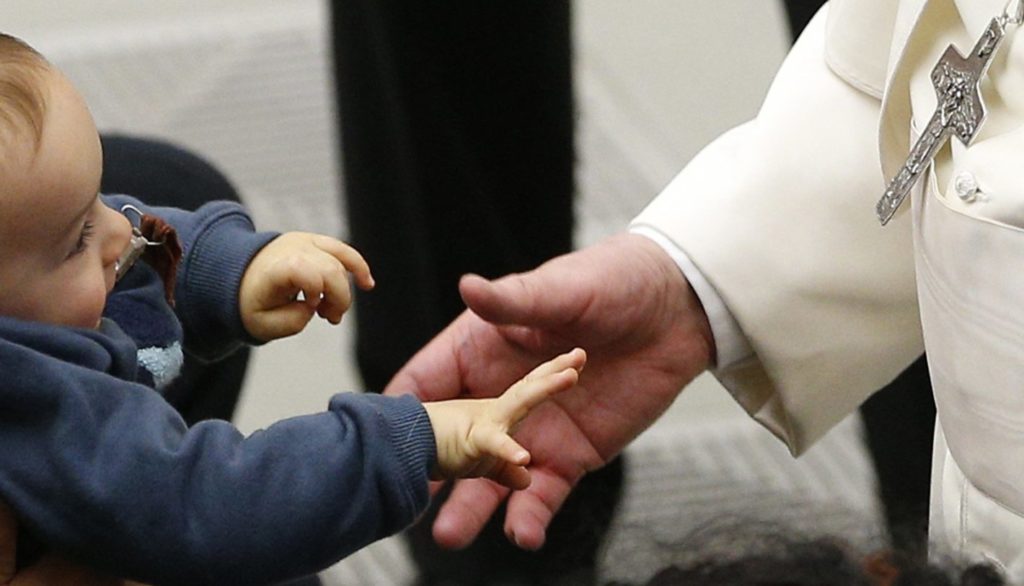At the audience on Wednesday, January 19, Pope Francis wanted to "deepen the figure of St. Joseph as a father in tenderness".
He recalled that "in the Apostolic Letter Patris corde (December 8, 2020) I was able to reflect on this aspect of St. Joseph's personality. In fact, even if the Gospels do not give us particulars about how he exercised his fatherhood, we can be sure that his being a "just" man translated also into the education given to Jesus. "Joseph saw Jesus progress day by day "in wisdom, in stature, and in favor with God and man" (Lc 2,52). As the Lord did with Israel, so he 'taught him to walk, and took him in his arms: he was to him as a father who lifts up a child to his cheeks, and stoops down to feed him' (cf. Os 11,3-4)" (Patris corde, 2)".
"The Gospels," the Holy Father continued, "testify that Jesus always used the word 'father' to speak of God and his love. Many parables have as their protagonist the figure of a father. [1] Among the most famous is certainly that of the merciful Father, recounted by the Evangelist Luke (cfr. Lc 15,11-32). Precisely in this parable, in addition to the experience of sin and forgiveness, the way in which forgiveness reaches the person who has made a mistake is also emphasized. The text reads: 'While he was still a long way off, his father saw him and, moved, ran and threw himself on his neck and kissed him effusively' (v. 20). The son was expecting a punishment, a justice that at the most could have given him the place of one of the servants, but he finds himself enveloped by the father's embrace. Tenderness is something greater than the logic of the world. It is an unexpected way of doing justice. That is why we must never forget that God is not frightened by our sins, by our mistakes, by our falls, but that he is frightened by the closure of our hearts, by our lack of faith in his love. There is great tenderness in the experience of God's love. And it is beautiful to think that the first one to transmit this reality to Jesus was precisely Joseph. In fact, the things of God always reach us through the mediation of human experiences".
The Pope then encouraged us to "ask ourselves whether we ourselves have experienced this tenderness, and whether we in turn have become witnesses to it. In fact, tenderness is not first of all an emotional or sentimental question: it is the experience of feeling loved and welcomed precisely in our poverty and misery, and therefore transformed by God's love".
"God does not trust only in our talents," Francis affirmed, "but also in our redeemed weakness. This, for example, leads St. Paul to say that there is also a project on his frailty. Thus, in fact, he writes to the community of Corinth: 'Lest I should be puffed up with the sublimity of these revelations, a sting was given to my flesh, an angel of Satan buffeting me [...]. For this reason three times I begged the Lord to depart from me. But he said to me, "My grace is sufficient for you, for my strength is shown perfect in weakness"' (2 Cor 12,7-9). The experience of tenderness consists in seeing the power of God pass precisely through that which makes us most fragile; provided that we are converted from the gaze of the Evil One who "makes us look at our fragility with a negative judgment", while the Holy Spirit "brings it to light with tenderness" (Patris corde, 2). Tenderness is the best way to touch what is fragile in us. [For this reason it is important to encounter God's mercy, especially in the sacrament of Reconciliation, by having an experience of truth and tenderness. Paradoxically, even the Evil One can tell us the truth, but, if he does, it is to condemn us. We know, however, that the Truth which comes from God does not condemn us, but welcomes us, embraces us, sustains us, forgives us' (Patris corde, 2)".
Already at the end of the catechesis, the Pope assured that "it does us good then to look at ourselves in the fatherhood of Joseph and ask ourselves if we allow the Lord to love us with his tenderness, transforming each one of us into men and women capable of loving in this way. Without this "revolution of tenderness" we run the risk of remaining imprisoned in a justice that does not allow us to rise up easily and that confuses redemption with punishment. For this reason, today I want to remember in a special way our brothers and sisters who are in prison. It is right that those who have made a mistake should pay for their error, but it is equally right that those who have made a mistake should be able to redeem themselves for their own error".
In conclusion, the Pontiff prayed the following prayer to St. Joseph:
"St. Joseph, father in tenderness,
teach us to accept to be loved precisely in what is weakest in us.
Make sure that we do not put any impediment
between our poverty and the greatness of God's love.
It arouses in us the desire to approach the Sacrament of Reconciliation,
to be forgiven and also to be able to love with tenderness
our brothers and sisters in their poverty.
Be close to those who have made a mistake and for this they pay a price;
help them to find, together with justice, also the tenderness to be able to start again. And teach them that the first way to begin again
is to sincerely ask for forgiveness.
Amen.








